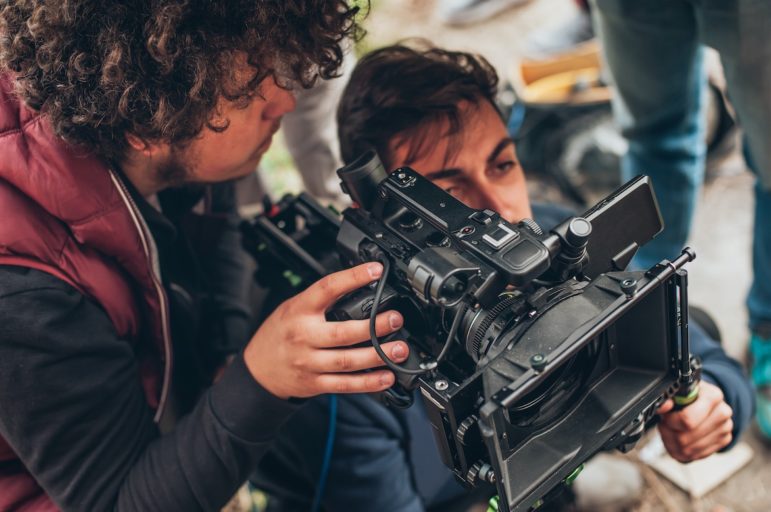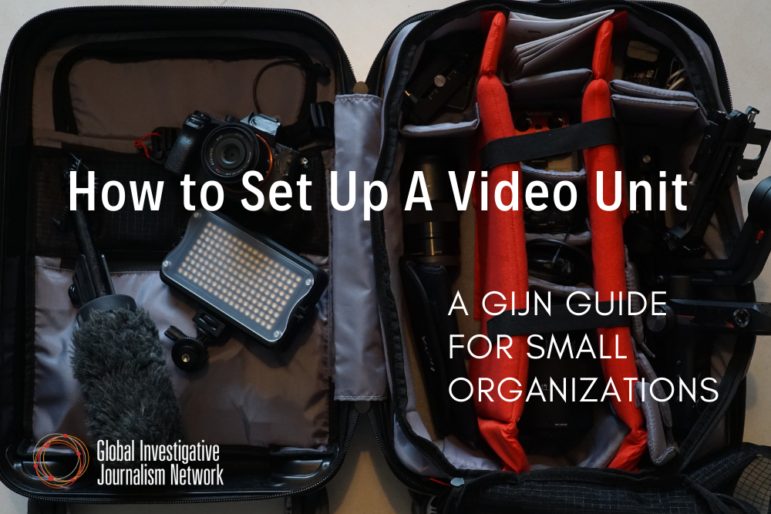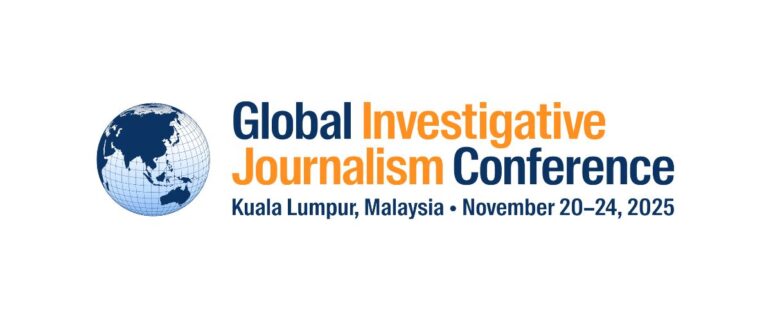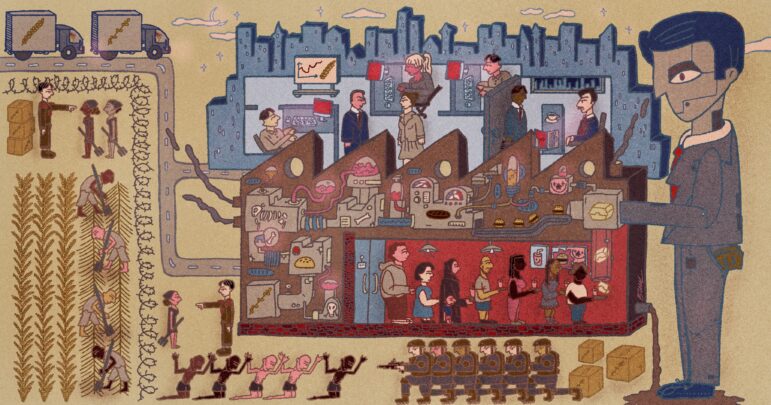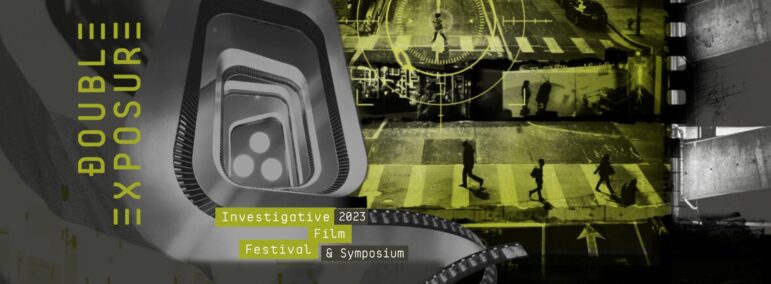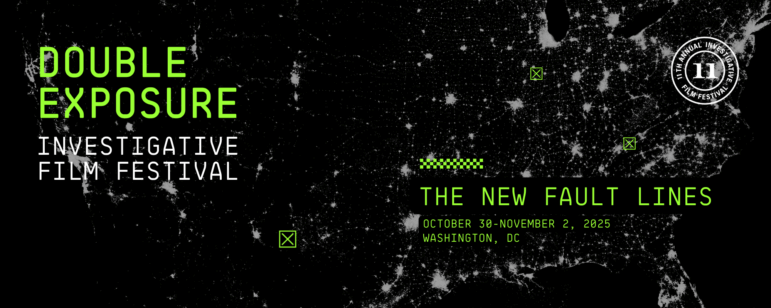

Image: Courtesy of Double Exposure Festival
2025 Double Exposure Festival: Interrogating New Fault Lines on Lethal Inequity, Human Resilience, and the Limits of Journalism
Films that examine the resilience of civil war refugees, lethal inequities, money laundering schemes, and the scope of journalism itself are among the outstanding investigative documentaries selected for the 2025 Double Exposure Festival & Symposium, which starts in Washington, DC today.
Presented by GIJN member 100Reporters for its 11th season, the annual DX event is the only US film festival dedicated to investigative journalism, and includes an extensive symposium program where attendees learn about the investigative methodologies, ethical challenges, and storytelling strategies directly from filmmakers.
This year, the four-day event will showcase 25 feature-length and short-form documentaries that shine new narrative light on urgent topics within North America and far beyond.
Reflecting its “New Fault Lines” theme for the 2025 season, the festival will highlight films that expose “fractures where society’s old narratives no longer hold.” For instance, any claims that systemic racism no longer remains a real and deadly threat in the US are disproven by the feature documentary “Listen To Me,” which provides clear evidence for how, and why, maternal mortality in the US is many times greater for Black women — regardless of income levels. And the Danish film “The Black Swan” moves public assumptions about the location of systemic crime away from the disadvantaged inner city and into the gleaming offices of a Scandinavian city. Meanwhile, the shifting front lines of the current information war between government secrecy and the urgent need for public transparency are illustrated in several outstanding films — and the rewards of secrecy are found deeply wanting.
GIJN highlights five notable, feature-length DX Festival documentaries on pressing topics that include innovative investigative approaches in the curated list below.
Listen to Me
The statistics on racial inequities in maternal healthcare in the US are shocking — such as this headline figure from the CDC: “Black women are three times more likely to die from a pregnancy-related cause than white women.” Other figures show that — despite a notable decline in US maternal mortality in the 20th century — the overall maternal mortality rate has increased sharply in the US despite cutting-edge medical advances. “Listen to Me” — a critically acclaimed documentary by directors Stephanie Etienne and Kanika Harris — not only highlights these alarming trends, but digs into their troubling causes by following the journeys of four Black women as they navigate a deeply biased healthcare system. The prominent role of systemic racism becomes an unavoidable truth when the film asks viewers to consider that Black women also face much higher risks regardless of education or income levels. But the documentary also highlights persistent strength and hope among Black communities, despite the breach in trust with institutions. And the film’s insider insights are deepened by the fact that Etienne and Harris themselves are also both birth workers and mothers.
Cover-Up
There are insiders and outsiders in “old school” investigative journalism, and Seymour Hersh is one of the craft’s famed outsiders. For more than six decades, he has looked intensely where few others were looking at all, and often pierced the veil of government narratives to find evidence of state-sponsored violence and alarming cover-ups. In an important and long-awaited experience for journalists and truth-seekers everywhere, this film by Oscar-winner Laura Poitras and Emmy-winner Mark Obenhaus documents the now-88-year-old Hersh’s storied, hyper-independent career, and examines the ethical risks and accountability rewards of aggressive, dog-with-a-bone journalism. Following along as Hersh reluctantly reopens his vast archive of reporting notes, the film shows how he pulled off jarring, impactful scoops, from the My Lai massacre of civilians in Vietnam to US military torture at Abu Ghraib in Iraq and recent atrocities in Gaza. It’s a story about accountability-at-all-costs, and a kind of relentless, principled journalism that protects sources, but not business interests. Notably, the documenting of this reporter’s long experience with government “spin” reveals evergreen patterns that journalists can learn from today. As the Guardian noted in a review: “‘Cover-Up’ adeptly illustrates the patterns of official cruelty: deny, downplay, quibble, destroy. Justify on the grounds of ‘national security.’ Repeat.”
The Black Swan
This shocking, hidden-camera-based film not only reveals how the suit-wearing enablers of money laundering actually advise their underworld clients, but does so in one of the countries least-known for corruption — until now. Focused around rented conference rooms in Denmark, the story follows meetings held by one courageous Copenhagen lawyer, who once served criminals, but who went undercover as a whistleblower for this project. Using footage from CCTV cameras concealed around the space over a six-month period, director Mads Brügger shows an array of biker gangs, politicians, and shady business executives candidly seeking “legal” advice on everything from tax evasion to money laundering and illicit financial manipulation from a fixer attorney known to the Scandinavian underworld as “The Ice Queen.” Like a spy thriller, the film keeps viewers on the edge of their seats as this lawyer’s acting performance calmly sidesteps successive threats of exposure, and conceals the reality of the film’s ethical rules that no complicity in actual crimes could take place. However, the project has already triggered several real criminal investigations, and received a vast audience in Denmark.
As 100Reporters notes, this film “shatters illusions of Scandinavian innocence.”
Khartoum
When the start of civil war upended the lives of people in Sudan in April 2023, it also upended the scope of one modest film project that was underway there to document the lives of five ordinary residents. So the four emerging Sudanese filmmakers — Anas Saeed, Rawia Alhag, Ibrahim “Snoopy” Ahmad, and Timeea Mohamed Ahmed — along with British director Phil Cox, responded with highly innovative techniques to tell a powerful new story of displacement, trauma, resilience, and, remarkably, hope.
“Khartoum” shows the experiences, memories, and humanity of a female entrepreneur, a resistance volunteer, a civil servant, and two children who sell bottles as a seemingly senseless conflict between the Sudanese Armed Forces and the Rapid Support Forces (RSF) militia erupts around them. It shows how everyone — including some of the filmmakers — are driven into exile. The project uses a highly innovative hybrid format, including animation, green-screen reenactments, documentary footage, and intimate iPhone filming in collaboration with its subjects to reveal their personal identities, and a fierce national spirit that is little known to journalists and citizens outside Sudan.
The Six Billion Dollar Man
This documentary offers a deeply researched, fast-paced account of the rise, fall, and long legal limbo of WikiLeaks founder Julian Assange, along with a prescient look at the broader collision between government secrecy and transparency. Using numerous witness interviews, archival documents, and unseen footage — including CCTV views of Assange’s strange existence within the Ecuadorian Embassy in London — filmmaker Eugene Jarecki presents compelling evidence of hidden agendas behind human and state actors involved in this information war saga. As 100Reporters notes, the documentary “illuminates how rapidly shifting ground — political, technological, and ethical — has redrawn the boundaries of accountability and press freedom… and the perils faced by truth-tellers at the intersection of power, technology, and journalism.”
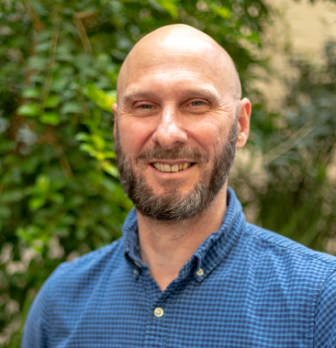 Rowan Philp is GIJN’s global reporter and impact editor. A former chief reporter for South Africa’s Sunday Times, he has reported on news, politics, corruption, and conflict from more than two dozen countries around the world, and has also served as an assignments editor for newsrooms in the UK, US, and Africa.
Rowan Philp is GIJN’s global reporter and impact editor. A former chief reporter for South Africa’s Sunday Times, he has reported on news, politics, corruption, and conflict from more than two dozen countries around the world, and has also served as an assignments editor for newsrooms in the UK, US, and Africa.

